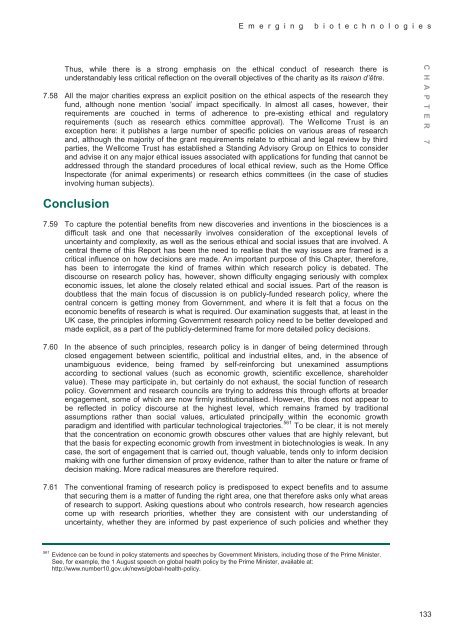Emerging biotechnologies: full report - Nuffield Council on Bioethics
Emerging biotechnologies: full report - Nuffield Council on Bioethics
Emerging biotechnologies: full report - Nuffield Council on Bioethics
Create successful ePaper yourself
Turn your PDF publications into a flip-book with our unique Google optimized e-Paper software.
E m e r g i n g b i o t e c h n o l o g i e s<br />
Thus, while there is a str<strong>on</strong>g emphasis <strong>on</strong> the ethical c<strong>on</strong>duct of research there is<br />
understandably less critical reflecti<strong>on</strong> <strong>on</strong> the overall objectives of the charity as its rais<strong>on</strong> d’être.<br />
7.58 All the major charities express an explicit positi<strong>on</strong> <strong>on</strong> the ethical aspects of the research they<br />
fund, although n<strong>on</strong>e menti<strong>on</strong> ‘social’ impact specifically. In almost all cases, however, their<br />
requirements are couched in terms of adherence to pre-existing ethical and regulatory<br />
requirements (such as research ethics committee approval). The Wellcome Trust is an<br />
excepti<strong>on</strong> here: it publishes a large number of specific policies <strong>on</strong> various areas of research<br />
and, although the majority of the grant requirements relate to ethical and legal review by third<br />
parties, the Wellcome Trust has established a Standing Advisory Group <strong>on</strong> Ethics to c<strong>on</strong>sider<br />
and advise it <strong>on</strong> any major ethical issues associated with applicati<strong>on</strong>s for funding that cannot be<br />
addressed through the standard procedures of local ethical review, such as the Home Office<br />
Inspectorate (for animal experiments) or research ethics committees (in the case of studies<br />
involving human subjects).<br />
C H A P T E R 7<br />
C<strong>on</strong>clusi<strong>on</strong><br />
7.59 To capture the potential benefits from new discoveries and inventi<strong>on</strong>s in the biosciences is a<br />
difficult task and <strong>on</strong>e that necessarily involves c<strong>on</strong>siderati<strong>on</strong> of the excepti<strong>on</strong>al levels of<br />
uncertainty and complexity, as well as the serious ethical and social issues that are involved. A<br />
central theme of this Report has been the need to realise that the way issues are framed is a<br />
critical influence <strong>on</strong> how decisi<strong>on</strong>s are made. An important purpose of this Chapter, therefore,<br />
has been to interrogate the kind of frames within which research policy is debated. The<br />
discourse <strong>on</strong> research policy has, however, shown difficulty engaging seriously with complex<br />
ec<strong>on</strong>omic issues, let al<strong>on</strong>e the closely related ethical and social issues. Part of the reas<strong>on</strong> is<br />
doubtless that the main focus of discussi<strong>on</strong> is <strong>on</strong> publicly-funded research policy, where the<br />
central c<strong>on</strong>cern is getting m<strong>on</strong>ey from Government, and where it is felt that a focus <strong>on</strong> the<br />
ec<strong>on</strong>omic benefits of research is what is required. Our examinati<strong>on</strong> suggests that, at least in the<br />
UK case, the principles informing Government research policy need to be better developed and<br />
made explicit, as a part of the publicly-determined frame for more detailed policy decisi<strong>on</strong>s.<br />
7.60 In the absence of such principles, research policy is in danger of being determined through<br />
closed engagement between scientific, political and industrial elites, and, in the absence of<br />
unambiguous evidence, being framed by self-reinforcing but unexamined assumpti<strong>on</strong>s<br />
according to secti<strong>on</strong>al values (such as ec<strong>on</strong>omic growth, scientific excellence, shareholder<br />
value). These may participate in, but certainly do not exhaust, the social functi<strong>on</strong> of research<br />
policy. Government and research councils are trying to address this through efforts at broader<br />
engagement, some of which are now firmly instituti<strong>on</strong>alised. However, this does not appear to<br />
be reflected in policy discourse at the highest level, which remains framed by traditi<strong>on</strong>al<br />
assumpti<strong>on</strong>s rather than social values, articulated principally within the ec<strong>on</strong>omic growth<br />
paradigm and identified with particular technological trajectories. 561 To be clear, it is not merely<br />
that the c<strong>on</strong>centrati<strong>on</strong> <strong>on</strong> ec<strong>on</strong>omic growth obscures other values that are highly relevant, but<br />
that the basis for expecting ec<strong>on</strong>omic growth from investment in <str<strong>on</strong>g>biotechnologies</str<strong>on</strong>g> is weak. In any<br />
case, the sort of engagement that is carried out, though valuable, tends <strong>on</strong>ly to inform decisi<strong>on</strong><br />
making with <strong>on</strong>e further dimensi<strong>on</strong> of proxy evidence, rather than to alter the nature or frame of<br />
decisi<strong>on</strong> making. More radical measures are therefore required.<br />
7.61 The c<strong>on</strong>venti<strong>on</strong>al framing of research policy is predisposed to expect benefits and to assume<br />
that securing them is a matter of funding the right area, <strong>on</strong>e that therefore asks <strong>on</strong>ly what areas<br />
of research to support. Asking questi<strong>on</strong>s about who c<strong>on</strong>trols research, how research agencies<br />
come up with research priorities, whether they are c<strong>on</strong>sistent with our understanding of<br />
uncertainty, whether they are informed by past experience of such policies and whether they<br />
561 Evidence can be found in policy statements and speeches by Government Ministers, including those of the Prime Minister.<br />
See, for example, the 1 August speech <strong>on</strong> global health policy by the Prime Minister, available at:<br />
http://www.number10.gov.uk/news/global-health-policy.<br />
133
















